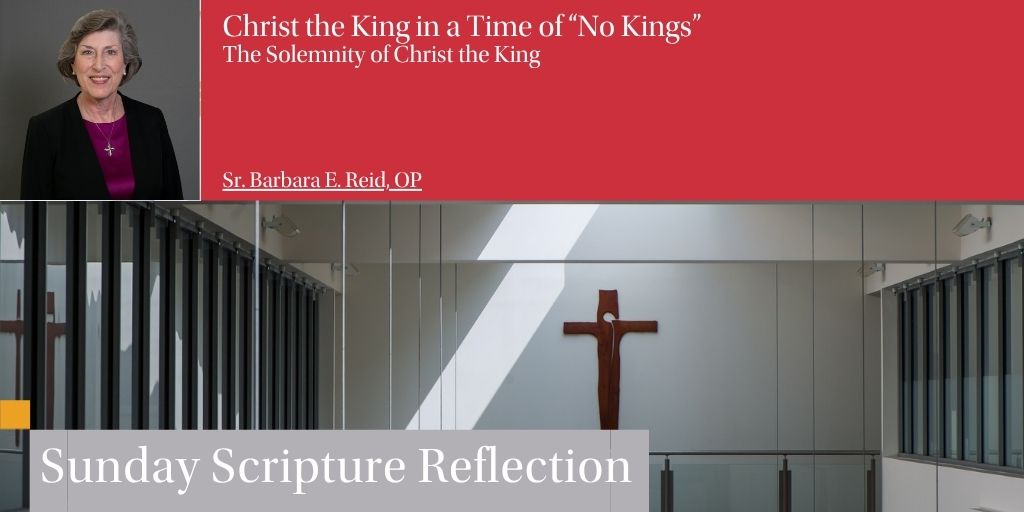

Readings:
2 Samuel 5:1-3
Psalm 122:1-2, 3-4, 4-5
Colossians 1:12-20
Luke 23:35-43
The Solemnity of Christ the King
These past months we have seen an increasing number of protests throughout the U.S. at which hundreds of thousands of people are rallying around the slogan “no kings.” Upset by authoritarian methods used by the President to accomplish his agenda, they call for measures that benefit the most vulnerable in our society, insisting on respect for the human dignity of all. This Sunday as we celebrate the Solemnity of Christ the King, our readings provide an opportunity to reflect on God’s power and how it can best be embodied in our world.
The first reading tells of the anointing of David as the second king of Israel. Monarchy was a relatively new experience for Israel. Prior to the appointment of Saul as their first king (1 Sam 10:1), God’s people had been ruled more loosely as a confederation of tribes for whom God periodically raised up judges as leaders. God was considered their ultimate ruler. The first Book of Samuel recounts that the people approached Samuel, the last of the judges, with the request for a king (1 Sam 8). The surrounding nations were ruled by kings and Israel wanted to have the same. They thought it could provide a more consistent system of governance and that a king could centralize their defenses and give them greater protection and security. There was, however, a shadow side to this choice. The biblical writers portray God as warning Israel that they were rejecting God’s rule in favor of a human institution (1 Sam 8:7), trusting more in human strength that God’s power. Moreover, with kingship would come heavy taxation, forced labor, and potential abuses of power (1 Sam 8:11-17). Nonetheless, the people refused to listen and they chose Saul as their first king.
Saul succeeded in uniting Israel and gave them increased political stability. He established a standing army and waged successful military campaigns against the Ammonites and Philistines. But he became increasingly less attentive to Samuel and to God. His reign ends tragically when he chooses to fall on his own sword rather than suffer defeat by the Philistines (1 Sam 31).
Today’s first reading picks up the story as David is anointed as Saul’s successor. There is renewed hope as the people believe that things can be better under a new king, one who was chosen by God for having a heart that was after God’s own heart (1 Sam 13:14). God makes a covenant with David that there will always be one of his descendants on the throne. David’s reign becomes legendary as a kind of golden age as he fostered worship of and reliance on God alone and promoted just relationships among the Israelites. But David also sets in motion a downward spiral of sinful actions that are followed by dire consequences that affect his descendants and all the Israelites, beginning with his murder of Uriah and his taking of Uriah’s wife Bathsheba (2 Sam 11-12).
Israel experienced both blessings and tragedies under monarchic rule. An advantage to having a king is that one man invested with authority could carry the weight of governance and make decisions on behalf of the people for their security and well-being. But they had also learned the disadvantages. They saw what happened when the king did not have the peoples’ best interests uppermost and when his judgment was impaired by greed and hunger for power. They saw that the common people had little voice in decisions that affected their lives. Especially slim was any chance that women’s perspectives would be heard, unless they were queen mothers like Bathsheba, who helped secure her son Solomon’s accession to the throne (1 Kings 1:11-2:19) or Athaliah, who influenced her son and grandson, ant then seized power for herself (2 Kings 11; 2 Chron 22).
In New Testament times, there were some people who were looking for a king like David to reassert Israel’s independence, rid the land of the Romans, and make wise decisions for the people. When Jesus appeared, proclaiming God’s kingdom, he offered an antidote to imperial ways. He criticized the way the “kings of the Gentiles” lorded their power over their people and demanded recognition for their benefaction. By contrast, he urged the leaders among his followers to be the servants of all (Luke 22:25-26), a manner of life he modeled for them, as he took up his itinerant mission with people at the lowest rungs of society. Unlike an offended monarch who imposes harsh punishments for infractions, he instead exercised power through forgiveness and compassion when there were transgressions.
Today’s gospel paints in stark contrast the power of imperial Rome, which brooks no challenges to its rule, and the “kingly” ways of Jesus that rest on forgiveness and love. Even as it appears that the former may win out, the gospel makes it utterly clear that Jesus’ merciful rule cannot be extinguished by death.
Even as he is mocked and taunted in his dying moments, Jesus continues to exercise the power of forgiveness both toward his executioners (Luke 23:34) and toward one of the criminals who acknowledges his sin and asks to be included in his realm (Luke 23:41-42). This is a very different power dynamic than when rulers pardon unrepentant criminals for being loyal to the ruler’s agenda.
As we reflect on the experiences of our biblical ancestors in faith and on our own experiences of various types of leadership, we have an opportunity to discern how to make our voices heard when leaders make decisions and take actions that go contrary to the good of the people. As well, we may reflect on our own exercise of power in the contexts where we lead. Are our hearts “after God’s own heart” as David’s was initially? Do we give away power through the kind of emptying out and service to the most needy as God and Jesus exemplify? Do we spread forgiveness and love? Then we may say “Yes” to that kind of kingship.
Parts of this reflection first appeared in America magazine and in Abiding Word. Sunday Reflections for Year C (Liturgical Press, 2012) 123-24.
Sr. Barbara E. Reid, OP
President Emerita
Carroll Stuhlmueller, CP Distinguished Professor of New Testament Studies